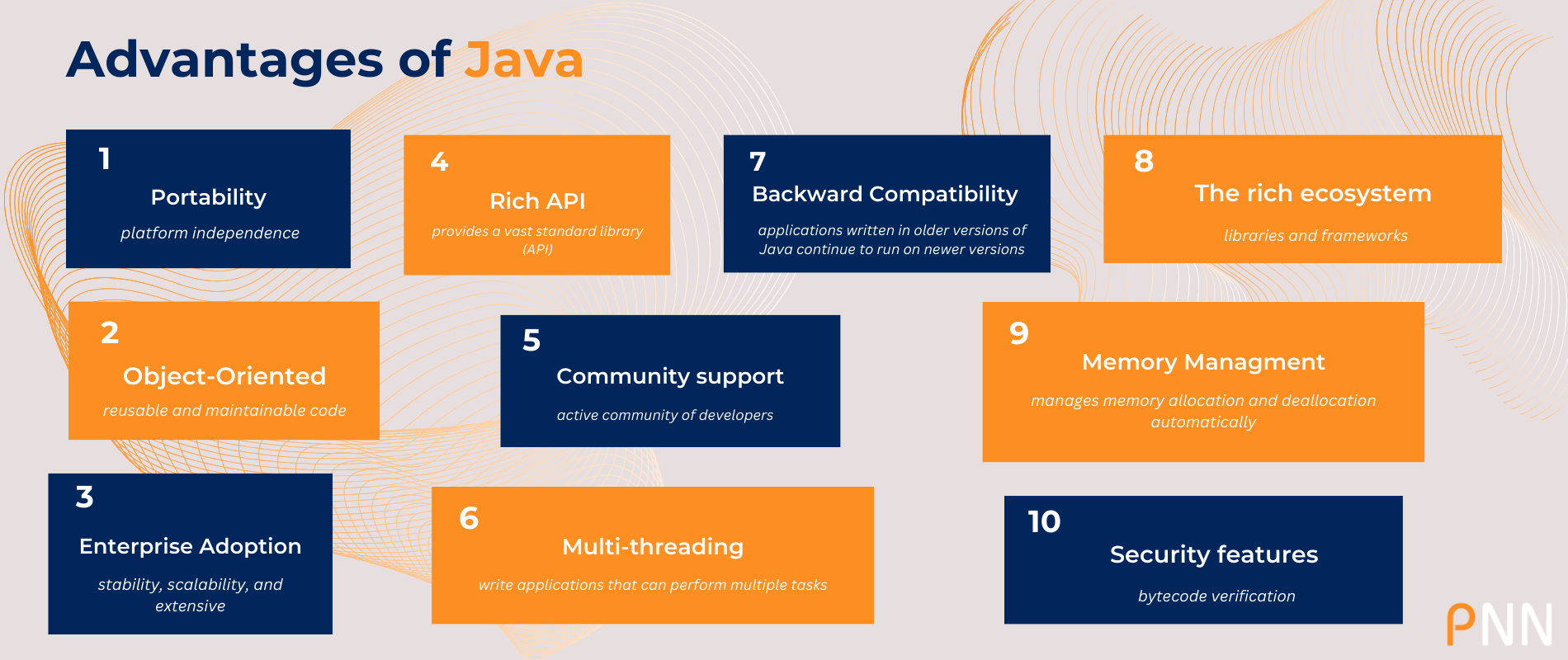What Is Java Used For?


Java stands out as a reliable programming language these days. But what is Java used for? It is a versatile, object-oriented, and high-performance programming language that has become an integral part of the software development landscape. Developed by Sun Microsystems in the mid-1990s, Java was developed with the slogan “Write once, run anywhere”, making it the preferred choice for various applications.
Java is a general-purpose programming language that follows the principles of simplicity, portability, and scalability. One of its outstanding features is the ability to work on various platforms. This is achieved by using the Java Virtual Machine (JVM), which acts as an intermediary between the compiled Java code and the underlying hardware.
Java is a programming possibility with a wide range of applications, which makes it a universal tool for developers. Java is used in a wide variety of fields — from desktop to mobile applications, from web development to embedded systems. Its platform independence and object-oriented nature make it an ideal choice for creating reliable and scalable software solutions.
Ever wondered what can Java does? The answer lies in its widespread use across various industries. In web development, Java is often employed to build dynamic and interactive websites. The Android operating system relies heavily on Java, showcasing its prowess in the realm of mobile technology. Additionally, enterprise-level applications, scientific applications, and even game development benefit from the flexibility and reliability of Java.
This programming language is popular among modern software developers. Many people are wondering: “how I can use Java?”. This is a common question among both beginners and experienced developers. The fact is that the popularity of Java can be explained by several factors. Firstly, its platform independence ensures that after writing a Java program, it can be run on any device with a compatible JVM. Secondly, the extensive libraries and frameworks available in the Java ecosystem simplify development tasks and accelerate the coding process. Thirdly, community support and constant updates from Oracle contribute to the adaptation of the language to new technologies.
Understanding how Java works involves learning about the compilation and execution process. The Java source code is first compiled into an intermediate form called bytecode. This bytecode is then interpreted and executed by the Java virtual Machine, ensuring compatibility across platforms. The JVM provides a secure environment for running code while managing memory allocation and rubbish collection.
The strengths of the Java platform lie in its ability to provide developers with a reliable and scalable environment. The architecture of the platform promotes modular development by allowing developers to create reusable components and libraries. This not only improves the convenience of code maintenance, but also facilitates collaboration between development teams. In addition, Java’s automatic memory management and exception handling help improve the reliability of the platform.
Java, as a high-level object-oriented programming language, is distinguished by its extensive set of application programming interfaces (APIs). These APIs serve as the foundation for Java’s versatility and scalability. From the basic java.lang package to specialized libraries for networking, database connectivity, and graphical user interfaces, the Java API ecosystem allows developers to optimize development processes and increase the reusability of code. Carefully designed classes and methods within these APIs encapsulate complex functionality. They also offer developers a standardized and efficient approach to common programming tasks. With its well-designed architecture, the Java API not only facilitates rapid application development, but also provides a solid foundation for creating scalable and supported software solutions. The Java platform provides reliable APIs and runtime environments for building enterprise applications.
Java provides an extensive set of features that contribute to its widespread adoption. Some key features include platform independence, object-oriented programming, multithreading, and an extensive standard library. These features allow developers to create efficient and maintainable code, which makes this language the preferred choice and answers the question: of how to make an application with Java.

As technology evolves, Java continues to evolve to meet the demands of the cloud era. Cloud development
has become famous, and Java, thanks to its adaptability, has been organically integrated. Containers, microservices, and server architectures allow developers to create scalable and resilient applications that can run successfully in cloud environments.
Java is a versatile and widely used programming language that can be employed for various applications, including Big Data and Analytics. When it comes to Big Data processing and analytics, Java is often utilized for its portability, scalability, and extensive ecosystem of libraries and frameworks. The language plays a key role in the field of big data and analytics. Its scalability and performance make it the preferred choice for dealing with the complexities of big data applications.
The stability and speed of Java make it perfect for developing AI applications like speech recognition and machine learning.
Java has been utilized to program sensors and hardware in edge devices that are capable of connecting autonomously to the internet.
Java is the programming language used for numerous popular mobile, desktop, and video games. Java is used in the construction of games that incorporate advanced technologies like machine learning or virtual reality.

Now let’s delve into the benefits that make Java programming a popular tool in software development.
Portability
One of the most significant advantages of Java is its platform independence. The ability to write code once and run it anywhere, thanks to the Java Virtual Machine. This portability ensures that Java applications can run seamlessly on various devices and operating systems.
A vast ecosystem
The rich ecosystem of Java libraries and frameworks allows developers to create reliable and feature-rich applications.
Scalability
Java scalability is a vital point for applications with a growing user base. The language’s ability to handle numerous simultaneous users and transactions makes it an ideal choice for building scalable and responsive systems. This scalability is especially important for enterprise-level applications and web services.
Community support
Java boasts an active and dynamically developing community around the world. Community support plays a significant role in problem-solving, knowledge sharing and continuous language development.
Security features
Java pays great attention to security, which makes it a reliable choice for creating secure applications. The Java platform includes various security features such as a robust access control mechanism, secure communication protocols and an integrated security manager.
Versatility in development
It manifests itself in its ability to adapt to different development needs. Whether you’re working on web development, mobile applications, big data processing, or enterprise-grade systems, Java provides the tools and frameworks you need to succeed. This versatility makes Java a popular language for developers with different skill sets.
In conclusion, Java is not just a programming language; it is a powerful and versatile tool that has shaped the digital landscape. From answering the question of where to use Java to exploring its capabilities and strengths, it is obvious that this language provides excellent solutions in the world of software development. As technology evolves, Java continues to adapt, proving its resilience and relevance in an ever-changing industry. Whether you are an experienced developer or a beginner, Java opens doors in the IT field.